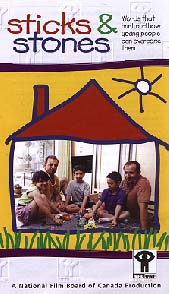| ________________
CM . . .
. Volume VIII Number 9 . . . . January 4, 2002
Everyone knows the words which complete the video's title: "Sticks and stones will break your bones, but names will never hurt you." And likely everyone also recognizes the hollowness of the latter portion of that expression for name calling, especially when it occurs during an individual's childhood or adolescence, can inflict enormous emotional and psychological pain. In the broadest sense, Sticks & Stones looks at name calling in schools, but its much narrower focus is on those children whose parents are gay or lesbian. Utilizing young elementary pupils from multi-racial schools, one in Vancouver and the other in Toronto, and with only minimal obvious adult intervention, the video's producers let the children's words truly speak for themselves. What clearly comes across is that, within the privacy of their homes, these children of gay/lesbian parents are most comfortable about being members of nontraditional families; however, when at school, they are highly cautious about sharing their parents' sexual orientation because their classrooms and schoolyards are places where they ready targets of taunting and teasing. Part of the "Celebrating Diversity: Resources for Responding to Homophobia" series, the video's overarching question is: How can we make schools safe for students who are gay or lesbian or who are from families with same sex parents? As Sticks & Stones is directed at teachers and other adults who work with students in grades 3-7, a final answer is not provided for the video's central purpose is to raise awareness among such adults that a serious problem does exist, one that demands locally developed solutions. Overall, the video is quite powerful in its emotional impact. However, in some ways, perhaps because of its short length, it does not do enough. For example, the children do share some of the hurtful words that are used to describe homosexuals, and the video then utilizes animation to explain the etymology of "faggot," an explanation which connects the word's origins to the witch burning of the thirteenth century. However, the video does not go on to explore the derivations of other terms. As well, Sticks & Stones only tangentially deals with students who may, themselves, be gay or lesbian. As support for the video's adult viewers, the video case liner notes provide suggestions for large group/classroom activities. Recommended. Dave Jenkinson is a teacher educator in the Faculty of Education, the University of Manitoba.
To comment on this
title or this review, send mail to cm@umanitoba.ca.
Copyright © the Manitoba Library Association. Reproduction for personal
use is permitted only if this copyright notice is maintained. Any other
reproduction is prohibited without permission.
Published by
NEXT REVIEW |TABLE OF CONTENTS FOR THIS ISSUE - January 4, 2002.
AUTHORS
| TITLES | MEDIA REVIEWS
| PROFILES
| BACK ISSUES
| SEARCH | CMARCHIVE
| HOME
|
